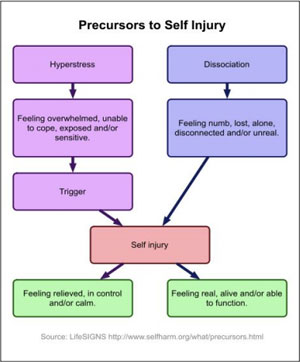Understanding Self-Harming Behavior
Goal
To be able to understand what self-injury is and the motivation for harming oneself
 What is Self-Injury? (Klonsky, 2007)
What is Self-Injury? (Klonsky, 2007)
Self-injury is a term used to describe intentional self-injuring of some part of the body without an intention to commit suicide. Self-injury is also described as self-harm, self-mutilation, or non-suicidal self-injury (NSSI), and may include a variety of behaviors.
Reasons for Self-Injuring (Klonsky, 2007; Hicks & Hinck, 2008)
Why do people hurt themselves? Although self-injury may hurt the person physically, self-injury provides a temporary relief from emotional problems. However, self-injury does not provide a long-term solution to the underlying problems. As a result, people who self-harm keep coming back for more relief.
The diagram explains the process that unfolds for people who engage in self-injury.
The most common reasons why people hurt themselves include:
- To decrease negative emotions
- As a way to “punish” oneself
- To provide a sense of reality
- To provide a way of hurting oneself without committing suicide
As a result of self-injury, many people receive a burst of hormones, such as endorphins, which provides a feeling of relief. This can begin an addictive cycle where the person self-injures, feels relief, experiences shame, and self-injures again.
How Can I Talk to Others About My Self-Harm?
 Feelings of shame are common among individuals who self-harm. They may view themselves as defective, strange, or isolated. Many have heard others make fun of people who self-harm. Others have been told that self-harming is just a way to “get attention.” Reactions like this can make it difficult to talk to other people about self-harm.
Feelings of shame are common among individuals who self-harm. They may view themselves as defective, strange, or isolated. Many have heard others make fun of people who self-harm. Others have been told that self-harming is just a way to “get attention.” Reactions like this can make it difficult to talk to other people about self-harm.
Although many people who self-harm would like to stop, it can be hard to stop self-harming completely. Self-harm serves a purpose for those who do it, and the desire to stop may not be as strong as the desire to keep self-harming. Because they may have mixed feelings about stopping self-harm, many people who self-harm may be reluctant to tell others about their behaviors.
It may be scary or difficult to talk to someone about your self-harming, especially if you have had negative reactions from others in the past. You also may not be sure that you really want to stop self-harming. However, if you want to reduce self-harming behaviors, it will be helpful to talk to someone.
Here are some ideas of people you could talk to:
- A professional counselor, who can discuss self-harm and help you understand the underlying reasons why you self-harm.
- A close friend, who can encourage you when you feel like self-harming.
- A religious/spiritual advisor
- A self-injury support forum
When you decide to tell someone about your self-harming, it may help them better understand what you are going through if you give them more information about self-harming. Some people do not mean to be hurtful, but can end up hurting others out of ignorance.
Next Step
The following video describes some of the reasons why people self-harm:
 What is Self-Injury? (Klonsky, 2007)
What is Self-Injury? (Klonsky, 2007)